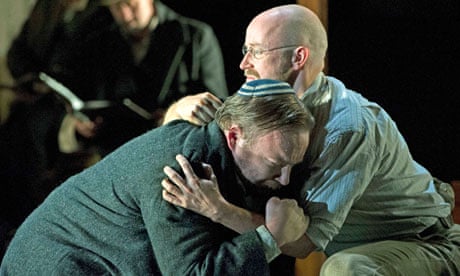The custody battle over Handel's biblical oratorios waged between opera companies and choral societies has not so far extended to Joshua, written in 1748 as one of a late burst of militaristic, Old Testament narratives depicting the journey of the Jewish people towards the Promised Land.
Charles Edwards, who both directs and designs this Opera North production, hedges his bets, stripping the stage to the rear loading bay, as if both to confirm that we are in a theatre and abnegate the theatricality of a work conceived for concert performance.
Edwards presents the work as if through the lens of photographer Rudi Weissenstein, who witnessed Israel's declaration of independence and created an unparalleled corpus of work documenting the birth of the nation. Weissenstein's panoramic, monochrome landscapes provide an austere backdrop to the oratorio's pastoral subplot. Yet some of the production's imagery is inflammatory, even crass. The bombastic general Caleb celebrates the destruction of Jericho by thrusting his hand up his daughter's skirt; the angel (exquisitely sung by treble Glyn Webster) appears as a cherubic, juvenile arms dealer who issues Joshua with an enormous sword and later upgrades this to an automatic rifle.
Musically, the production is on a sounder footing. Conductor Stephen Layton draws a fine range of expressive colour, from the warbling woodwind that accompanies Achsah's mellifluous praise of the linnet and the lark, to some strident trumpeting sufficient to bring down the walls of Jericho.
Daniel Norman traces Joshua's development from anxious stripling to grand elder statesman, though Handel's florid coloratura rarely sits easily with the tenor voice. The outstanding counter-tenor Jake Arditti has a more gratifying time as the shepherd-cum-conquering hero Othniel. The developing maturity of Fflur Wyn's Achsah is signified by her decision to take up smoking halfway through, but she manages to sing limpidly despite the impediment. Henry Waddington's creepy Caleb has a fierce bass tone that transcends the bizarre psychological profile imposed on him. Perhaps a dinner suit and a music stand would have been preferable after all.

Comments (…)
Sign in or create your Guardian account to join the discussion